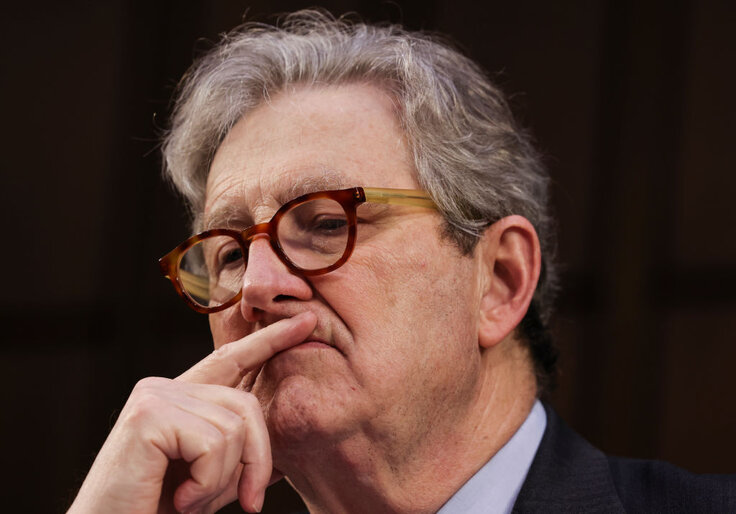Sen. John Kennedy (R., La.) signed on to Sen. Sheldon Whitehouse’s (D., R.I.) request for Supreme Court justices' travel records, giving bipartisan credentials to Whitehouse’s latest attempt to attack the Court’s conservatives.
Whitehouse and Kennedy sent the letter to Attorney General Merrick Garland and the director of the U.S. Marshals Service, which requests all agency documents related to trips on which Marshals Service personnel accompanied the justices over a 10-year period. The justices are supposed to disclose reimbursed travel, but their reporting has been spotty at times.
That information will help lawmakers identify trips or junkets the justices did not include in annual disclosure reports, according to the letter. The justices are not bound by an ethics code, so there are no obvious penalties for failing to disclose gifts, reimbursed travel, or outside income short of an impeachment.
Whitehouse has for years tried to link the Court’s conservatives to a "dark money" scheme to empower big business. The Rhode Island senator chaired a Senate subcommittee hearing on March 10 entitled "What's Wrong with the Supreme Court: The Big Money Assault on Our Judiciary." Two Democrat-picked expert witnesses accused conservative groups of "bribing" the Court’s Republican appointees through ad campaigns and amicus coalitions.
Whitehouse has connected the justices' travel disclosures with those allegations.
"These disclosures fall woefully short of the transparency Americans deserve from top federal judges who are not subject to ethics rules," Whitehouse said when the justices released their 2019 disclosures. "Particularly when the Court has become so politicized, and so surrounded by anonymous dark-money interests, real transparency matters."
Identifying a disclosure lapse by a conservative justice would provide a useful cudgel for Whitehouse. Kennedy believes increased judicial transparency is a bipartisan concern.
"Liberal advocacy groups are spending big to push radical nominees, and effective oversight requires bipartisanship," a spokeswoman for Kennedy told the Washington Free Beacon. "In this case, asking reasonable questions could go a long way toward combating the left’s undue political influence and protecting the Supreme Court’s independence, integrity, and safety. Taxpayers expect and deserve as much."
The senators directed their request to the U.S. Marshals Service because the marshals provide security for the justices when they travel outside Washington, D.C. As such, the agency should have records on judicial travel arrangements that justices may have neglected to share.
Totally apart from debates over judicial legitimacy, an oversight group says the justices are unduly acclimated to secrecy and ought to align their disclosure practices with those of the other branches. The justices are not bound by an ethics code, and some question whether Congress could lawfully impose such a code on the Court, so the justices have light disclosure obligations as compared with other federal officials.
"Accountability should be a bipartisan interest, and it's my hope that this request, coupled with subsequent legislation, compels the justices to be more thorough when filling out their disclosures," said Gabe Roth, executive director of the oversight group Fix the Court.
A 2020 report from Fix the Court showed those concerns don’t map on to ideology. Justice Clarence Thomas’s 2018 disclosure showed teaching income from two universities but did not indicate who paid for travel and accommodations during those periods. The report showed the University of Florida separately offered Thomas the use of a charter plane when he taught a winter-term class on property law.
Similarly, the University of Rhode Island booked a block of rooms in a posh hotel for Justice Sonia Sotomayor when she delivered a commencement speech there in 2016. The expense did not appear on her disclosure for that year.
Safety concerns are also at play. While the justices may request protection when traveling, they are not required to do so. Antonin Scalia did not request a Marshals Service detail for his visit to the West Texas hunting resort where he died in 2016. Marshals did not arrive on scene to officially confirm his death to Washington for hours, and emails Fix the Court uncovered through records requests show agency officials were anxious the time lag would become public.
The volatile political environment is also a consideration. An aggrieved attorney attacked U.S. District Judge Esther Salas at her New Jersey home in 2020, murdering her son and gravely wounding her husband. Authorities later revealed the gunman planned to assassinate Sotomayor. The U.S. Judicial Conference has since called on Congress to boost funding for the Marshals Service to better protect judges, among other things.
The Supreme Court’s public information office did not respond to a request for comment.
